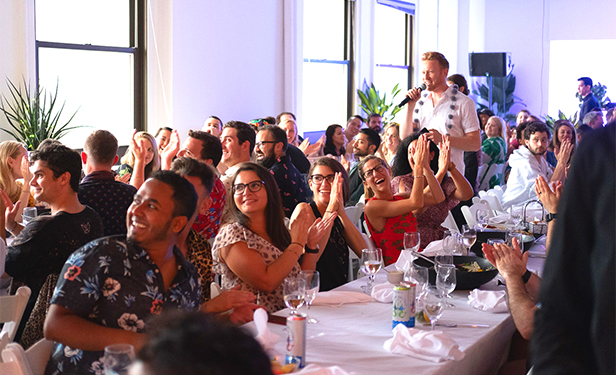Tech Giants: Six Good Minutes With Splash CEO Ben Hindman

You have about six minutes to read this article before your attention may wane, according Ben Hindman, CEO and founder of the event marking platform Splash. It’s not personal, but the reality is that digital content needs to be cut into shorter time periods to remain effective.
“I think many formats are still stuck in the past,” said Hindman, who was an event planner at Thrillist before creating Splash, which counts several Fortune 500 companies as clients. “The shorter and more concise you get, the better.”
There’s wiggle room to about 10 minutes for a solid chunk of content, he explained, but the six-minute mark is when users start getting antsy.
This insight is especially important as the events industry moves to its next chapter. A recent study Splash conducted found that 79% of companies expect to conduct hybrid meetings even when it’s considered safe to fully return to face-to-face. The same study found that 55% of respondents agree with Hindman that shorter —20-30 minutes— is sweeter.
Not one to waste time (naturally), Hindman has expanded the reach of Splash’s staff from primarily five metropolitan areas to 50 U.S. regions of various sizes. Already a fan of intimate meetings over large conferences, Hindman said the move will assist the return to smaller face-to-face events across more of the country.
“My expectation is you're going to see smaller events coming out front — small is going to be big,” he said.
Here are six other predictions of how Hindman expects to see events going forward:

1. Fortune will favor the first. While not advocating doing anything unsafe, Hindman says the groups that meet the fastest will be strongest in the long run. “There is a real opportunity to capture the hearts and minds of those that are ready to come back into the world,” he said. “The companies that figure out how to hold safe, trustworthy, relevant and valuable events, are going to have an opportunity to recapture and rebuild a community of attendees — an audience that is going to skyrocket their event programs over the next couple of years.”
2. Pre-meeting communities will emerge. Building trust, as noted above, is vital to nudge attendees back to IRL — in real life — events. One way to build comradery ahead of the in-person component with a virtual meeting. Attendees get to know each other in this early networking session and help set boundaries for face-to-face. It’s a wonder this was not utilized prior to COVID.
3. Hybrid will split in different directions. Hindman loves lists, to the point he has categorized various hybrid offerings. “Hub-and-spoke” is how he describes the model many of us are accustomed to, namely with concurrent events happening in-person and online. “Hybrid livestream” is a variation of this, but with presenters at one venue but the audience remains at home. “Hybrid interactive” features in-person guests interacting with virtual attendees but “I actually haven’t seen a great product for that,” Hindman noted. Lastly, there is “hybrid parallel” in which the tracts hardly integrate, which Hindman said is a precursor to moving entirely online. There are opportunities for both in-person and online guests to find each other, but they are separate event experiences happening in parallel.
4. Bad meetings will fall to the wayside. “There are so many sh*tty events and you can feel free to quote me on that,” Hindman said. More eloquently, the Splash CEO clarified that many events have lost their path and there is no particular need to meet in-person versus online. Between inertia, health concerns and economic realities, attendees will skip any show they are on the fence about. The meandering shows will be gone. “That’s a good thing,” he added.
5. Connections will overtake content. Event companies have filled quiet time with content — webinars, podcasts, virtual events, etc. — since the pandemic began. The emphasis for face-to-face will turn toward networking, Hindman said. “The host of organizers of the future are going to spend as much time on connection as they do on content, if not more,” he said. “That's connected to the unique value” of an event.
6. The bar will be raised. “I am seeing a deeper craving for the in-person experience as I've ever seen,” he said. Yet the expectations are going to be different. Attending in-person will have to be worth the ROI. That places the burden on event organizers to raise a show’s engagement level, which benefits exhibitors, buyers and other attendees. In some ways, the past 12 months have emphasized what we missed most of all. “There is a lot of value in this reset,” Hindman said.
Don’t miss any event-related news: Sign up for our weekly e-newsletter HERE and engage with us on Twitter, Facebook, LinkedIn and Instagram!


Add new comment